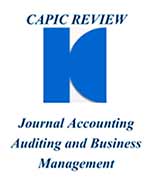Ethical Orientation of Accounting Students: Evidence from a State University in Chile
Published 2015-12-10
Keywords
- Ethical Judgment,
- Higher Education,
- Illicit Copy,
- Plagiarism and Public Accountancy and Auditing (CPA)
How to Cite
Abstract
This study aims at knowing, analyzing, and explaining the ethical orientation of students in the career of Public Accountancy and Auditing (CPA) in a State University of Chile on the basis of deontological and teleological considerations. Similarly, it seeks to explain the student decision to reward or punish a conduct that is ethical or unethical in order to guide their education on the basis of ethics.
Thus, the objectives in the study are: 1) to determine the ethical orientation CPA College students in academic work.
The research is based on an adaptation of the design and the measures used by Hunt and Vasquez-Parraga (1993). The results reveal an interesting reality in the ethical background of CPA college students. The vast majority has a clear idea of how to reach ethical judgments, but many are confused when they have to make decisions (such as reward or punish) regarding those acts, ethical or unethical. The vast majority understands the value of morals, they know, but many people get stuck in the consideration of the consequences and do not decide based on the moral value of the conduct, but on the basis of the positive impact they want achieve or the negative consequences that you want to avoid. The study concludes with theoretical reflections and pedagogical applications.
Downloads
References
Education, Vol. 5, 27-43.
2. Barba, L. y Alcántara, A. (2003). “Los valores y la formación universitaria”, Reencuentro, núm. 38 (diciembre). Disponible en: http://www.xoc.uam.mx/-cuaree/
3. Bunn, Douglas N., Caudill, Steven B. y Gropper, Daniel M. (1992). “Crime in the Classroom: An Economic Analysis of Undergraduate Student Cheating Behavior”, The Journal of Economic Education, vol. 23, núm. 3, pp. 197-207.
4. Chaves, Jorge Arturo (2002). “Ética, empresa y educación superior”. Revista Iberoamericana de Educación. No 29. Editada por la Organización de Estados Iberoamericanos (OEI).
5. Cobo, J.M. (2003). Universidad y ética profesional. Teoría de la Educación, 15, 259-276.
6. Colby, Anne; Ehrlich, Thomas; Beaumont, Elizabeth y Stephen, Jason (2003). Educating citizens: Preparing america’s undergraduates for lives of moral and civic responsability, San Francisco: Jossey-Bass.
7. Cortina, Adela (2000). El universo de los valores. En Educación y Valores. Editorial Biblioteca Nueva. Fundación Argentaria. Madrid, España.
8. Cortina, A. (2002), La Dimensión Pública de las Éticas Aplicadas, Revista Iberoamericana, 29, 45-64.
9. Flores, Jason y Vásquez-Párraga, Arturo Z. (2009). “Ethical Orientations and Attitudes of Hispanic Business Students”, Journal of Academic Ethics, vol. 7, núm. 4, pp. 261-275.
10. Goodlad, S. (1995). The quest for quality. Sixteen forms of heresy in higher education, Buckinghan: SRHE y Open University.
11. Hunt, Shelby D. y Vásquez-Párraga, Arturo Z. (1993). “Organizational Consequences, Marketing Ethics, and Salesforce Supervision”, Journal of Marketing Research, vol. 30, Febrero, pp. 78-90.
12. Hunt, Shelby D. y Vitell, Scott (1986). “A General Theory of Marketing Ethics”, Journal of Macromarketing, vol. 6, núm. 1, pp. 5-16.
13. McCabe, Donald L. y Treviño, Linda Klebe (1996). “What we know about Cheating in College: Longitudinal Trends and Recent Developments”, Change: The Magazine of Higher Learning, vol. 28, núm. 1, pp. 28-33.
14. Mixon, Franklin G. (1996). “Crime in the Classroom: An Extension”, The Journal of Economic Education, vol. 27, núm. 3, pp. 195-200.
15. Montaner, J., & Perozo, J. S. (2008). Formación ética del contador público. Caso: Facultad de ciencias económicas y sociales de la Universidad del Zulia. Revista De Ciencias Sociales, 14(2), 379-387.
16. Mougan Rivero, C. (2003). “Liberalismo y profesión docente”, Revista Internacional de Sociología (España), núm. 34, 135-166.
17. Schön, .D. (1992). La formación de los profesionales reflexivos. Barcelona: Paidós.
18. Torres J., Rafael S. (1999). Los Contadores Públicos y cómo son percibidos por la Sociedad Venezolana. Revista FAC ES. Año 8. Nº 16. Caracas-Venezuela.


































